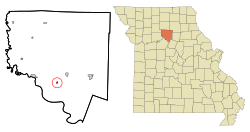Dalton, Missouri facts for kids
Quick facts for kids
Dalton, Missouri
|
|
|---|---|

Location of Dalton, Missouri
|
|
| Country | United States |
| State | Missouri |
| County | Chariton |
| Area | |
| • Total | 0.18 sq mi (0.47 km2) |
| • Land | 0.18 sq mi (0.47 km2) |
| • Water | 0.00 sq mi (0.00 km2) |
| Elevation | 686 ft (209 m) |
| Population
(2020)
|
|
| • Total | 7 |
| • Density | 38.67/sq mi (14.94/km2) |
| Time zone | UTC-6 (Central (CST)) |
| • Summer (DST) | UTC-5 (CDT) |
| ZIP code |
65246
|
| Area code(s) | 660 |
| FIPS code | 29-18118 |
| GNIS feature ID | 2396676 |
Dalton is a very small village in Chariton County, Missouri, United States. It's a quiet place with a unique history. In 2020, only 7 people lived there, making it one of the tiniest communities around!
Contents
Where is Dalton?
Dalton is located in the state of Missouri. You can find it at coordinates 39.397130 degrees North and -92.991248 degrees West.
The village covers a very small area. According to the United States Census Bureau, it is about 0.47 square kilometers (0.18 square miles) in size. All of this area is land.
Dalton's History
The area near Dalton has a long history. Famous explorers Lewis and Clark camped here on June 12, 1804. They met a man named Pierre Dorion, who had lived with the Sioux people for many years. Their journals describe the "Dalton Cut-Off" as a creek connected to the Missouri River.
More than 60 years later, after the Civil War, the village of Dalton was officially started. This happened because a new railroad needed a stop in the area. The village was named after William Dalton, who gave 40 acres (about 160,000 square meters) of land for the railroad. A train station was built for the St. Louis & Pacific line.
Dalton Vocational School
Dalton is most famous for the Dalton Vocational School. This school was sometimes called the "Tuskegee of the Midwest." It was started in 1907 by Nathaniel Bruce. He was a student and follower of Booker T. Washington, a famous educator.
The school's first main building was built in 1909. This was after a flood forced them to move to higher ground. In 1923, the state government gave money to build more facilities. These included a model farm home, a trade shop, and places for hogs and chickens. The school campus eventually grew to 123 acres (about 0.5 square kilometers).
Nathaniel Bruce believed in giving African American young people a practical education. The school focused on vocational training, agriculture, and home economics. Students from many areas were bussed to Dalton to learn these skills.
In 1924, the University of Missouri College of Agriculture started helping supervise the school. Later, Lincoln University, which was a college for Black students in Jefferson City, took control.
The school closed after the Supreme Court's 1954 ruling. This ruling said that schools had to be integrated, meaning students of all races could attend together. The last school year was 1955–1956. The buildings and land were later sold. Today, most of the buildings are gone, with only two remaining.
Dalton Today
Dalton has faced challenges over the years. Changes in farming and big floods have made the village much smaller. The 1993 flood especially impacted the area.
Today, Dalton has a grain elevator, a post office, two churches, a community center, and a few houses. Even though it's small, the community still celebrates its history. They have an annual event called the Dalton Days festival.
The area near the Dalton Cut-Off is now known as the "Golden Triangle" by people who love birds. Many waterfowl spend the winter there because it's a great habitat for them.
The Dalton Vocational School Historic District was added to the National Register of Historic Places in 2002. This means it's recognized as an important historical site.
Population Changes
| Historical population | |||
|---|---|---|---|
| Census | Pop. | %± | |
| 1880 | 199 | — | |
| 1890 | 332 | 66.8% | |
| 1900 | 223 | −32.8% | |
| 1910 | 261 | 17.0% | |
| 1920 | 398 | 52.5% | |
| 1930 | 357 | −10.3% | |
| 1940 | 342 | −4.2% | |
| 1950 | 237 | −30.7% | |
| 1960 | 197 | −16.9% | |
| 1970 | 135 | −31.5% | |
| 1980 | 76 | −43.7% | |
| 1990 | 38 | −50.0% | |
| 2000 | 27 | −28.9% | |
| 2010 | 17 | −37.0% | |
| 2020 | 7 | −58.8% | |
| U.S. Decennial Census | |||
Dalton's population has changed a lot over the years. In 1890, there were 332 people living there. The population grew to 398 in 1920. Since then, the number of residents has slowly decreased. By 2020, only 7 people lived in the village.
See also
 In Spanish: Dalton (Misuri) para niños
In Spanish: Dalton (Misuri) para niños
 | Toni Morrison |
 | Barack Obama |
 | Martin Luther King Jr. |
 | Ralph Bunche |

